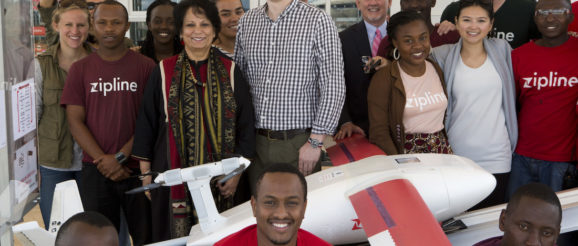Rwanda’s virtuous cycle of vaccination and innovation | Vaccines work

Anuradha Gupta, DCEO of Gavi, the Vaccine Alliance
“Before, we sent a technician to Kigali to get blood, and it took about four to five hours” says Alice. “But now we just make a request on WhatsApp or email, and within a few minutes, we get the blood. So you see, life has changed for a lab technician like me, and for doctors [who now] save patients quickly.”
I recently returned from an illuminating trip to Rwanda, where I visited drone company and Gavi partner Zipline, which is already helping Alice and her colleagues save lives by delivering blood to rural areas, and could do the same for other medical products in future. This innovative project is emblematic of Rwanda’s unique and successful approach to health that has seen huge progress for the country’s citizens over the past twenty years.
Nurse Umwamariya Alice collects a Zipline delivery. Credit: Karel Prinsloo/Gavi/Arete
Like a phoenix from the ashes, Rwanda has emerged as a trailblazer in global health and development since the genocide of 1994. Its troubled past has made Rwanda’s rapid gains all the more remarkable. More than twenty years on, child mortality has been cut in half and basic immunisation coverage now stands at an exceptional 98%.
None of this is by accident. Rwanda’s deliberate, transformative approach has combined excellent leadership and community mobilisation not only to achieve this impressive vaccine success in a resource constrained setting, but to also pave the way for broader health gains.
This couldn’t have happened without immunisation champions like President Kagame and former health ministers, who understood what immunisation could do to protect children and build a strong economic foundation for their growing nation. This leadership led Rwanda not only to their high coverage, but also to be an early adopter for new and vital vaccines such as those preventing rotavirus diarrhoea, pneumococcal disease and cervical cancer.
The best leaders know that leadership doesn’t stop with them, but has to be unlocked at all levels. Rwanda has taken this to heart, developing its workforce through investments in continuing education. I was privileged to be at the recent launch of the Gavi-funded Expanded Programme on Immunization Leadership and Management Programme (EPILAMP) a leadership training initiative supported by the Rwandan University of Global Health Equity, Yale Global Health Leadership Initiative and PATH. The programme aims to hone the management and leadership skills of mid and senior level immunisation staff through a very innovative blended learning methodology. This follows the already successful and expanding STEP training programme, launched in Rwanda three years ago, which unites private and public sectors to further bolster management skills of East African supply chain professionals.
The author speaking at the EPILAMP launch. Credit: Gavi/Karel Prinsloo
Engaging with communities is vital to ensure quality of services and their sustained uptake and Rwanda has lead the way here too. Since 2007, the country has placed community health workers in every village to help populations living even in the most rural settings to demand services like vaccination. It’s through this model (as well as their pioneering community health insurance scheme) that Rwanda has managed to bring healthcare to 91% of its population, blazing a trail for universal health coverage in the region.
When political leadership and community participation meet in the middle, there is space for innovative partnerships to thrive. Politicians are engaged, healthcare managers are empowered and communities are receptive to the technology and techniques that could revolutionise their access to healthcare. In this way Rwanda has become a hub for global and regional learning, health innovation and immunisation progress. Gavi is proud to support them as they continue to prove the value of innovative partnerships which, based on experience in Rwanda, have the potential the spread across the 73 countries Gavi supports.
We see in Rwanda a virtuous cycle where engagement in health at every level has driven demonstrable success, which in turn has attracted further investment and even greater achievements. It’s a powerful example of how to accelerate progress, and one from which other countries can learn.
